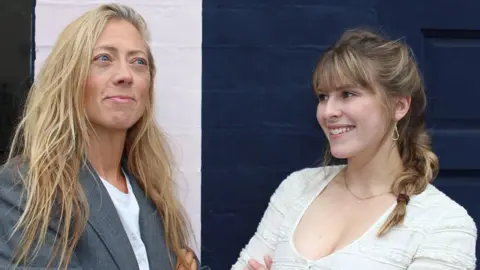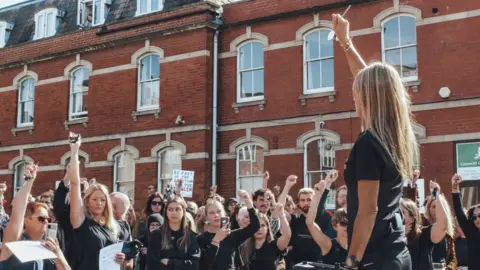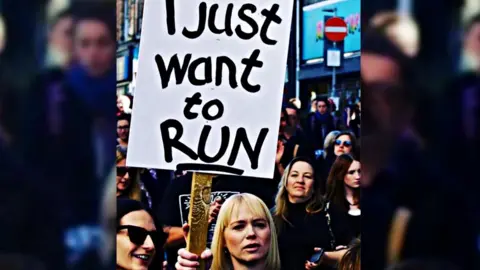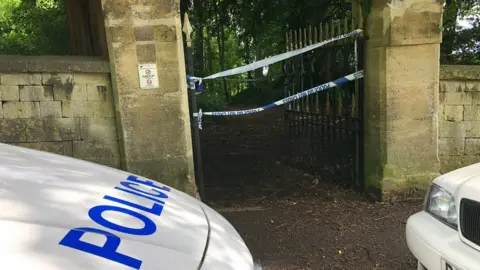Stroud sexual assaults: Local women fighting back with campaign
 This Ends Now
This Ends NowWhen hundreds of people marched through the small Gloucestershire town of Stroud to highlight a series of sexual assaults in the area, many of them held a set of keys.
It symbolised the way some women prepare to defend themselves while walking to their cars at night, or jogging.
"I think a lot of men don't quite realise sometimes the length women go to, to stay safe," said Sydney-Anne McAllister, one of the organisers.
"We change our routes, we run in groups rather than alone. We can't go out past a certain time."
On 25 November, another march - this time organised by Reclaim the Night - is expected to attract hundreds of people to Stroud in response to the attacks.
'All my friends experience this'
Ms McAllister, a future trainee solicitor, and local author Nikki Owen, are members of the same running club. As the sex attacks increased over the summer, they decided to take action.
What came out of those discussions was a local protest which has developed into a not-for-profit organisation called This Ends Now.
The attacks in Stroud, named the best place to live in the UK by the Sunday Times in 2021, may have shocked some who saw the town as a rural idyll, but both women say harassment is an everyday experience.
 This Ends Now
This Ends Now This Ends Now
This Ends Now"I think it's safe to say every single female friend of mine, along with family members, have experienced some sort of harassment," said Sydney.
"It's on a spectrum, from cat-calls to degrading language to more serious things like rape and assault.
"When I went to Bristol University for my law degree, I had personal experience of being stalked, groped, harassed etc, all of these things.
"I think it's just something that is part-and-parcel of being a woman unfortunately."
Nikki has similar tales to tell, from being targeted while running, sexual harassment of people she knows to family members avoiding nightclubs completely at university because of the dangers of date rape and spiking incidents.
"As a society we've normalised this to the point where it's something we're used to as women," she said.
'There is no deterrent'
The aim of This Ends Now is to tackle issues such as police and media language around sex crimes, education and conviction rates.
Its founders say that from teenage boys being able to access violent pornography on their phones to crimes being "softened" in media headlines to low conviction rates, it all comes back to one source - the patriarchy.
"It's an ingrained system that's almost invisible but dictates not only how women should be or not be, but how men should be as well," said Nikki.
Sydney said that as well as women getting the vote long after men - and even then it was initially only for those who owned property - rape within marriage was only made illegal in the 1990s.
"Because women have not had that say for so long, everything in society is built by and for men - whether or not that is conscious is another debate - but our legal system, our political system has predominantly been made by men."
Sydney - who founded media platform Femlegal - said figures show only a "tiny, tiny proportion" of rapes result in someone being charged.
"There is no consequence, no deterrent," she said.
"So you have to ask why a woman would report these issues, why would they go to the police?"
Importance of language
Since the two women put their names and faces out in the public domain, they have received derogatory comments online and in person.
They are also aware that by using terms such as "smash the patriarchy" they will experience resistance, but are keen for their campaign to be as inclusive as possible - starting with the police.

"We've been working with Gloucestershire Constabulary, looking at how words are used," said Nikki. "They've been really open, which is great.
"We want to make sure the survivors of these attacks are considered, and secondly that outwardly these offences aren't softened, that we use the right language to describe the crime.
"We look at the use of the word "proposition". A woman can proposition a man on a date, and that's perfectly ok.
"When you use that word in a headline when it comes to a sexual offence, suddenly it's softened, because we're used to hearing that word in a nicer way.
"Don't call a teenage girl a 'young woman', she's not - she's still a girl."
'This hurts men as well'
Sydney said that rather than seeing men as the enemy, she and Nikki believe the patriarchy hurts both sides.
"Look at something like male suicide rates. There's this big thing around women being emotional, women talking to each other," she said.
"Men aren't supposed to do that, they're supposed to 'man up' and be strong, be the provider. Those are harmful stereotypes."
"This is not a women's issue, this is a human issue," said Nikki.
"When men ask us how they can step up, it's a case of challenging this behaviour, of calling it out.
"That is the most important part. Without men challenging each other and having uncomfortable conversations, we'll get nowhere."
'Stop victim blaming'
In a statement, Gloucestershire Constabulary said it had been working with This Ends Now for months towards a "shared goal of ending violence and intimidation against women and girls".
The force said it was working on a 'Words Matter' policy to apply to language used around sexual assaults and rapes.
"For example using the active voice rather than the passive, saying that a man has raped a woman rather than a woman was raped by a man, and focussing on the perpetrator rather than the victim so as to avoid any semblance of victim blaming," it added.
When it came to low conviction rates for rapes, the force said it was working with specialist academics to "improve how officers respond to and investigate rape".
"Nationally conviction rates are low for these types of crime. This is an issue for the criminal justice system and not just policing alone, and Gloucestershire Constabulary is committed to improving them."
It said Gloucestershire Police was one of the forces piloting the latest initiatives as part of Operation Soteria Bluestone, a revised approach to investigating rape and sexual offences.
"This operation hopes to improve conviction rates for these types of crimes which are well-known for being difficult to convict."

Update on offences
Gloucestershire Police said it was still investigating rapes in the Dudbridge underpass and Stroud Cemetery, but was not linking the attacks.
A man arrested in connection with the Dudbridge rape remains on police bail. The force said it was still supporting the victim of the cemetery rape and was still waiting to hear from witnesses who it believed were in the area.
Two other men have been charged in connection with incidents on the local canal and cycle path where lone women were targeted, it said.

Follow BBC West on Facebook, Twitter and Instagram. Send your story ideas to: [email protected]
